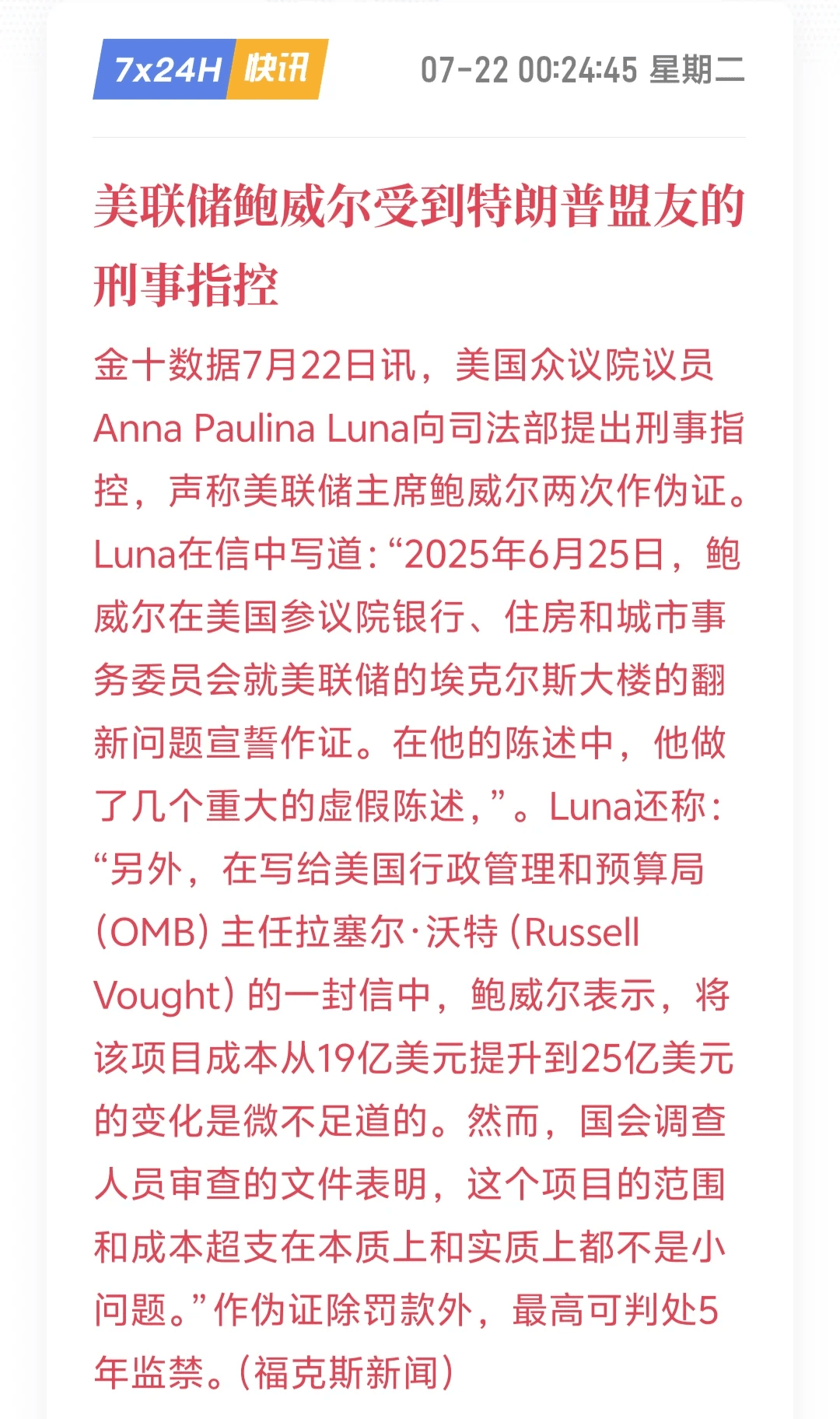On July 22, 2025, Federal Reserve Chairman Powell was criminally charged by U.S. House Representative Anna Paulina Luna for allegedly committing perjury twice during the renovation project of the Federal Reserve's Eccles Building — accused of making significant false statements during Senate testimony on June 25, and describing a project cost increase from $1.9 billion to $2.5 billion as 'insignificant' in a letter to the Director of the Office of Management and Budget, while Congressional investigations revealed that cost overruns were actually a substantive issue. If convicted, Powell could face fines and up to five years in prison. This incident not only plunged the Federal Reserve into a whirlpool of public opinion and politics but also cast new uncertainty over the already turbulent crypto world.
1. Transmission of volatility from the Federal Reserve puts short-term pressure on the crypto sector
As the global financial 'heart', the Federal Reserve's policies and personnel changes have always had far-reaching impacts. The charges against Powell have triggered concerns in the market regarding the stability and independence of Federal Reserve policies, which are rapidly transmitting to the crypto sector that is highly sensitive to the macro environment.
The Federal Reserve's monetary policies, such as interest rate hikes and cuts, directly affect the liquidity of the dollar and market risk appetite. Historical experience shows that when there are doubts about Federal Reserve policies, funds tend to be reallocated among assets. The crypto sector, as a high-risk, high-volatility domain, is particularly sensitive to such changes — when market concerns heat up, some funds may withdraw from cryptocurrencies like Bitcoin and Ethereum, shifting towards traditional 'safe' assets, which could lead to a decline in cryptocurrency prices in the short term.
Taking Bitcoin as an example, in the past, when the Federal Reserve signaled interest rate hikes or got caught in policy controversies, its price often experienced adjustments. If the Powell incident continues to ferment, leading to chaos in market expectations for the Federal Reserve's subsequent policies, the volatility of cryptocurrencies like Bitcoin could further amplify, increasing short-term risks for investors.
2. Heightened regulatory shadows, compliance faces obstacles. The Powell incident essentially reflects the complex relationship between U.S. financial regulation and political maneuvering, and the crypto sector, which has long been in a regulatory gray area, is particularly sensitive to U.S. regulatory trends.
Behind the incident is a power struggle among U.S. political forces over financial regulatory authority. If political maneuvering escalates, regulators may adopt more aggressive measures towards the financial market, with the crypto sector as a focus, potentially facing stricter scrutiny: enhancing regulation of cryptocurrency exchanges, restricting cryptocurrency derivatives trading, etc., which would directly impact the ecology and trading activity of the crypto sector.
Globally, U.S. financial regulatory trends often have a demonstration effect. If it tightens regulations due to the Powell incident, other countries may follow suit in adjusting their crypto policies, further constraining the living space of the crypto sector and introducing more uncertainty into the compliance process.
3. Breaking the deadlock in a crisis: Opportunities and purification. Crises also conceal opportunities. The financial volatility triggered by the Powell incident may prompt some investors to reevaluate their asset allocations, turning to cryptocurrencies that genuinely possess 'decentralized' attributes and can resist traditional financial risks. High-quality projects that adhere to technological innovation and focus on community and ecological development may stand out amid the volatility and attract long-term funds.
At the same time, the incident will accelerate the 'purification' and upgrading of the crypto sector. In the face of external regulatory and market pressures, project teams will pay more attention to compliance operations, technological security, and value creation, eliminating speculative 'air coins' and promoting the healthy and mature development of the crypto sector.
The Powell incident is a microcosm of the intersection between traditional finance and the cryptocurrency sector, bringing both short-term volatility and regulatory pressure to the crypto world, while also providing an opportunity for 'distilling the truth' for its long-term development. Whether the crypto sector can achieve compliance and value enhancement depends on the industry's self-adjustment and changes in the global financial environment. However, it is certain that after this shock, the crypto sector will continue to move forward with a more mature posture in the financial tide.
#稳定币监管风暴 #NFT板块领涨 #山寨季來了? #加密立法新纪元 #上市公司加密储备战略


